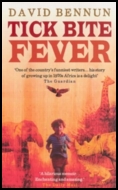| Text to separate 1 |  | Text to separate |  |
| Text to separate 1 | Tick Bite Fever | Text to separate | British As A Second Language |
|
Available now from Ebury Press:
British As A Second Language More details here Click here to buy it Also published by Ebury: Dave's highly acclaimed African memoir Tick Bite Fever |
| Alice In Chains [The Guardian, 1999] ALICE IN CHAINS MUSIC BANK *** Columbia IF EVER a Central Committee for Naming Things should be summoned into existence, I would like to nominate, for the chair, the inventor of the word “grunge”. Talk about hitting the proverbial nail bang on its bent and rusty head. How appetising, you're bound to ask, can anything called “grunge” turn out to be? As tempting as a bowl of toasted gravel? Slightly less enticing than a walrus in a Wonderbra? Not quite as much fun sandpapering your piles? So it proved. Grunge was a form of American rock music from the early Nineties which gave us Nirvana and migraines. A more turgid, joyless, whingeing cacophony it would be hard to imagine this side of Red Chinese Opera, and at least they dress up for that. Grunge deliberately looked and sounded as dingy, abrasive and piss-awful as its perpetrators - usually a clump of charmless, workshy muppets with a collective moniker like Pondweed or Slurry - could make it. Kurt Cobain pretty much took grunge with him when he committed his conclusive act of nihilism five years ago (morbidly appropriate that grunge should have been whelped and abruptly terminated in the same setting - the garage.) And even then it seemed a safe bet that, out of the entire grunge scene, only his work would endure. Nirvana were the finest rock band of the Nineties; none of their contemporaries came close. With, arguably, one exception. And here it is. Odds are you've never heard of Alice in Chains. Huge in the States, they never matched the impact in the UK of Pearl Jam, Soundgarden or even Mudhoney. But if Nirvana were the punk rock Beatles - and that was their avowed intention - then Alice In Chain were something even odder; a heavy metal Walker Brothers, almost. Not that they had any of the Walkers' lugubrious elegance. Their songs, smothered in fearsome gloom, were hostile, despairing and rancid with self-pity. They also had a blinding way with a tune; a remarkable gift for harmony; and a sound which walloped from the speakers with force enough to make your eyeballs spin in their sockets. They really were very good. They were, in addition, a miserable bunch of buggers, even by the prevailing standards of their wretched peers. A typical interview exchange would go like this: “So your new album is about heroin addiction. . .” “Hey! Fuck you! We don't want to talk about that. It's personal. Do we ask you how many times your girlfriend sucks your dick?” “Well, if I'd just made an album about it, you'd be entitled to.” “Fuck you! Eat a bowl of cum, motherfucker!” The album in question was Dirt, their masterpiece, whose opening seconds were perhaps the most genuinely startling noise since The Sex Pistols, and which swiftly impressed itself as one of the rare worthwhile post-Velvets smack records. There are few things duller than junkies bleating about their habit, but Alice In Chains brought so much sound and fury and bleeding, uprooted viscera to the subject that they simply blew away any reponse less sturdy than awe. Great as Dirt assuredly was, I still had my doubts as to whether Alice In Chains merited a box set. Not that merit and box sets are much associated nowadays. Anyone who manages to make it in to the studio for a couple of years without getting hit by a milk float is apparently entitled to a lavish multiple-CD retrospective. S Club 7: The Anthology, here we come. But listening to Music Bank, it's striking how consistent Alice In Chains were. Even their early gropings towards the liquid lead sound perfected on Dirt have an embittered flair to them, and some - like Queen Of The Rodeo, the story of a shit-kicking redneck transvestite - are actually funny. Clocking in at well over three hours of music, plus a CD Rom of bits and bobs, Music Bank could use a few laughs .This is not a box set in which to immerse yourself for any great length of time. Not if you don't wish to surface with an overpowering urge to give someone, preferably singer Layne Staley, a good slapping. He doesn't half go on, the whining git. But a random dip will often as not reveal something extraordinary. Proof, if it were needed, that talent and likeability are nodding acquaintances at best. All material on this site is copyrighted © to David Bennun and may not be reprinted or reused without permission. So there. Back to Music Reviews
Back to Pop |
| Text to separate 1 |  | Text to separate |  |
| Text to separate 1 | Tick Bite Fever | Text to separate | British As A Second Language |